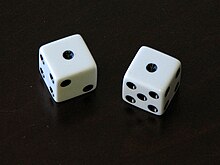Biscuit (game)
Appearance
This article relies largely or entirely on a single source. (February 2023) |
 When a pair of 1s is rolled, all players must drink | |
| Genres | Drinking |
|---|---|
| Players | 3+ |
| Playing time | Based on # of players and random chance |
Biscuit (also referred to as Bizkit or Biskit) is a drinking game played with two dice.
Rules
Each player rolls the dice one time. The first person to roll a 7 becomes "The Biscuit". That player then rolls the dice, with the following results:
- 1-1
- Everyone take a drink
- 6-6
- Roller has to invent a rule which will be applied for the rest of the game. Breaking this rule requires a penalty drink to be taken.
- 2-2, 3-3, 4-4, 5-5 (doubles)
- Roller gives drinks to one or several players equal to the number on one of the dice rolled.
- 1-2 (total of 3)
- Called a "challenge". Roller chooses a player, that player must roll the dice. Add the result of each dice. The first roller has to make a higher result. If the first roller wins, the chosen player has to drink the difference between the two results. If the first roller failed, he has to drink the difference.
- 1-6, 2-5, 3-4 (total of 7)
- All players put a thumb on their forehead and say "Biscuit". Last player to do so drinks and becomes the new "Biscuit".
- 3-6 4-5 (total of 9)
- Person to right of roller drinks
- 4-6 (total of 10)
- Roller drinks
- 5-6 (total of 11)
- Person to left of roller drinks
- The number 3
- Whenever the number "3" appears on the dice, the "Biscuit" player has to take a drink. (If the dice show 3-3, the player takes two drinks.) Having done so, they cease to be the Biscuit, and the game will have no Biscuit until a 7 is rolled (or another rule nominates a Biscuit).
Having rolled, dice are then passed to the next player clockwise around the table.
References
- http://www.buveurs.com/biskit Archived 2010-03-23 at the Wayback Machine

